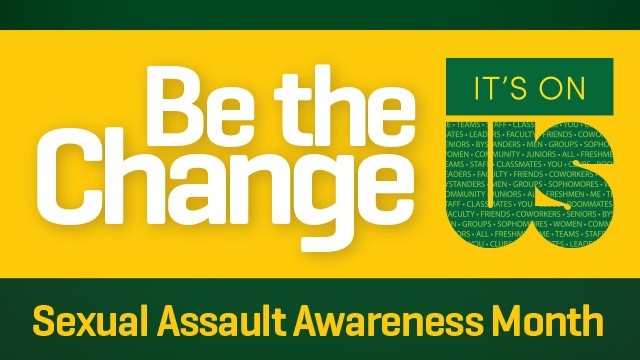Below is a Lariat Letter submitted by the Title IX team at Baylor:
You responded. We heard you.
Last spring, we asked students to take a survey that focused on the campus environment and their experiences with harassment, stalking and sexual violence. Most (73 percent) of the respondents strongly agreed or agreed with the statement: “If a friend or I experienced sexual misconduct, I know where to go to get help on campus.”
However, of those who did report an act of sexual misconduct, only 7 percent went directly to the Title IX office. In light of national Sexual Assault Awareness Month, we would like to clarify our role on campus so students feel confident receiving help should they experience sexual harassment or interpersonal violence.
Why should I report to the Title IX Office? What can they do for me?
The decision to report sexual misconduct is incredibly personal and can be difficult. Fear of being blamed or not believed, concerns of retaliation and not wanting others to know are a few of the reasons sexual assault and harassment are among the most underreported crimes across the country. This is not unique to our campus; the U.S. Department of Justice estimates that only 15 to 35 percent of sexual assaults are reported to law enforcement.
For students seeking legal recourse, such as a criminal investigation or a restraining order, consider reporting to law enforcement. Local reporting options include the Waco Police Department and the Baylor University Police Department.
If sexual or gender-based harassment or assault is interfering with a student’s participation in school activities, she or he should consider reporting to the Title IX office. We help students access accommodations, support and other resources that uphold the right to an education in an environment free from discrimination.
It is your choice whether to report to the university, to law enforcement, neither or both. Campus Title IX processes and law enforcement investigations operate independently of one another, although the university will coordinate information with the police department when possible.
For students seeking spiritual and/or emotional support, consider reporting to a confidential source. They are not required to report the information to law enforcement or university officials. At Baylor, confidential sources include the Counseling Center, Health Services Center and university chaplain Burt Burleson.
What happens after a report is shared with the Title IX office?
Another reason some students may be hesitant to report to our office is due to uncertainty about the process after a report is made. Upon receiving a report of prohibited conduct, we provide support and assistance in obtaining university and community resources, such as counseling and academic support as interim measures. We also provide information about preserving evidence, obtaining medical treatment and contacting police if needed and desired.
We then determine whether we have jurisdiction over the report. Title IX is a university process, and the remedies we can provide are related to a student’s education at Baylor.
The person who makes the report can request a university resolution process, anonymity, no university action or to not participate in the university process. We seek to honor these requests if possible, while also protecting the safety of individuals and the university community. When proceeding with a resolution process, the person who is said to have committed an act(s) of sexual misconduct is notified and given the option to participate or not participate. Our office is committed to a fair and equitable process for all parties involved.
University resolution can take one of two forms. Disciplinary resolution involves an investigation and hearing with possible sanctions. Alternative resolution includes informal options for resolving reports.
The Title IX office exists to ensure that harassment based on gender does not interfere with the right to an education. For more information on our process, procedures or to access resources and reporting options, visit www.baylor.edu/titleix.
The Title IX Team consists of Maureen Holland, interim Title IX coordinator; Alexandra Fulcher, deputy Title IX coordinator; Carolyn Hughes, Title IX investigator; Michael Noble, Title IX investigator; Christina Jeong, coordinator of student support; Elizabeth Wellinghoff, training and prevention specialist; and Brianna Gilbreath, administrative manager.






